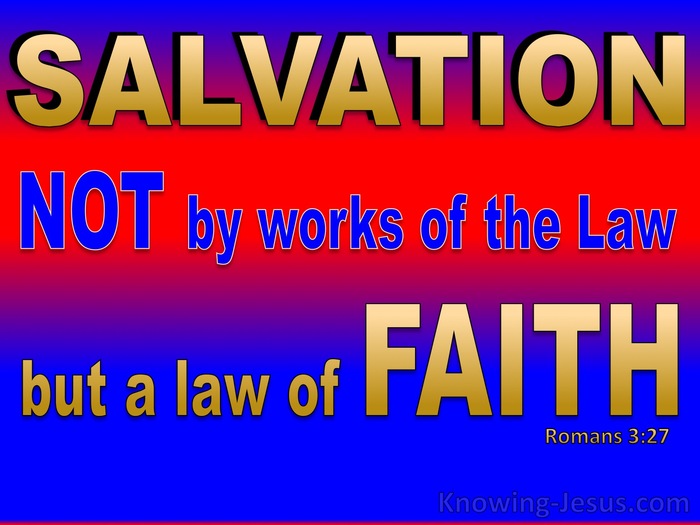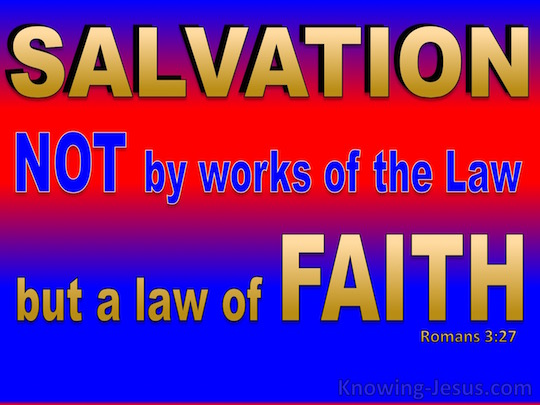Parallel Verses
Weymouth New Testament
Where then is there room for your boasting? It is for ever shut out. On what principle? On the ground of merit? No, but on the ground of faith.
New American Standard Bible
Where then is
King James Version
Where is boasting then? It is excluded. By what law? of works? Nay: but by the law of faith.
Holman Bible
Where then is boasting?
International Standard Version
What, then, is there to boast about? That has been eliminated. On what principle? On that of actions? No, but on the principle of faith.
A Conservative Version
Where then is the boasting? It is excluded. By what law, of works? No, but by a law of faith.
American Standard Version
Where then is the glorying? It is excluded. By what manner of law? of works? Nay: but by a law of faith.
Amplified
Then what becomes of [our] boasting? It is excluded [entirely ruled out, banished]. On what principle? On [the principle of good] works? No, but on the principle of faith.
An Understandable Version
Where then is the [basis for] boasting [i.e., over being right with God]? There is not any. Is it by [obedience to] a law? Is it by doing certain deeds? Not at all, but by a law of faith.
Anderson New Testament
Where, then, is boasting? It is excluded. By what law? Of works? No; but by the law of faith.
Bible in Basic English
What reason, then, is there for pride? It is shut out. By what sort of law? of works? No, but by a law of faith.
Common New Testament
Where then is our boasting? It is excluded. On what law? On the law of works? No, but on the law of faith.
Daniel Mace New Testament
what reason then is there for boasting? it is excluded. what, by the ceremonial law? no: but by the law of faith.
Darby Translation
Where then is boasting? It has been excluded. By what law? of works? Nay, but by law of faith;
Godbey New Testament
Then where is boasting? It is excluded. By what law? of works? No; but by the law of faith.
Goodspeed New Testament
Then what becomes of our boasting? It is shut out. On what principle? What a man does? No, but whether a man has faith.
John Wesley New Testament
Where is boasting then? It is excluded. By what law? Of works?
Julia Smith Translation
Where then boasting? It was excluded. By what law? of works? No: but by the law of faith.
King James 2000
Where is boasting then? It is excluded. By what law? of works? Nay: but by the law of faith.
Lexham Expanded Bible
Therefore, where [is] boasting? It has been excluded. By what kind of law? Of works? No, but by a law of faith.
Modern King James verseion
Then where is the boasting? It is excluded. Through what law? Of works? No, but through the law of faith.
Modern Spelling Tyndale-Coverdale
Where is then thy rejoicing? It is excluded. By what law? By the law of works? Nay: but by the law of faith.
Moffatt New Testament
Then what becomes of our boasting? It is ruled out absolutely. On what principle? On the principle of doing deeds? No, on the principle of faith.
Montgomery New Testament
Then what becomes of boasting? It is shut out. What sort of law forbids it? A law of works? No, but a law of faith.
NET Bible
Where, then, is boasting? It is excluded! By what principle? Of works? No, but by the principle of faith!
New Heart English Bible
Where then is the boasting? It is excluded. By what manner of law? Of works? No, but by a law of faith.
Noyes New Testament
Where then is the boasting? It is excluded. By what law? of works? Nay; but by the law of faith.
Sawyer New Testament
Where then is the boasting [of the Jew]? It is excluded. By what law? Of works? No; but by the law of faith.
The Emphasized Bible
Where, then, the boasting! It is excluded. Through what kind of law? Of works? Nay! but through a law of faith:
Thomas Haweis New Testament
Where then is boasting? It is excluded. By what law? of works? No: but by the law of faith.
Twentieth Century New Testament
What, then, becomes of our boasting? It is excluded. By what sort of Law? A Law requiring obedience? No, a Law requiring faith.
Webster
Where is boasting then? It is excluded. By what law? of works? No; but by the law of faith.
Williams New Testament
So where has human boasting gone? It was completely shut out. On what principle? On that of doing something? No, but on the principle of faith.
World English Bible
Where then is the boasting? It is excluded. By what kind of law? Of works? No, but by a law of faith.
Worrell New Testament
Where, then, is the boasting? It was excluded. By what manner of law? Of works? Nay; but by a law of faith.
Worsley New Testament
Where then is boasting? it is excluded: by what law? of works? no: but by the law of faith.
Youngs Literal Translation
Where then is the boasting? it was excluded; by what law? of works? no, but by a law of faith:
Themes
Interlinear
Dia
Dia
References
Word Count of 37 Translations in Romans 3:27
Prayers for Romans 3:27
Verse Info
Context Readings
Boasting Excluded
26 with a view to demonstrating, at the present time, His righteousness, that He may be shown to be righteous Himself, and the giver of righteousness to those who believe in Jesus. 27 Where then is there room for your boasting? It is for ever shut out. On what principle? On the ground of merit? No, but on the ground of faith. 28 For we maintain that it is as the result of faith that a man is held to be righteous, apart from actions done in obedience to Law.
Cross References
Romans 2:23
You who make your boast in the Law, do you offend against its commands and so dishonour God?
Romans 4:2
For if he was held to be righteous on the ground of his actions, he has something to boast of; but not in the presence of God.
1 Corinthians 1:29-31
to prevent any mortal man from boasting in the presence of God.
Romans 2:17
And since you claim the name of Jew, and find rest and satisfaction in the Law, and make your boast in God,
Mark 16:16
He who believes and is baptized shall be saved, but he who disbelieves will be condemned.
Luke 18:9-14
And to some who relied on themselves as being righteous men, and looked down upon all others, He addressed this parable.
John 3:36
He who believes in the Son has the Life of the Ages; he who disobeys the Son will not enter into Life, but God's anger remains upon him.
Romans 3:19
But it cannot be denied that all that the Law says is addressed to those who are living under the Law, in order that every mouth may be stopped, and that the whole world may await sentence from God.
Romans 7:21
I find therefore the law of my nature to be that when I desire to do what is right, evil is lying in ambush for me.
Romans 7:23
but I discover within me a different Law at war with the Law of my understanding, and leading me captive to the Law which is everywhere at work in my body--the Law of sin.
Romans 7:25
Thanks be to God through Jesus Christ our Lord!)
Romans 8:2
for the Spirit's Law-- telling of Life in Christ Jesus--has set me free from the Law that deals only with sin and death.
Romans 9:11
and even then, though they were not then born and had not done anything either good or evil, yet in order that God's electing purpose might not be frustrated, based, as it was, not on their actions but on the will of Him who called them, she was told,
Romans 9:32
And why? Because they were pursuing a righteousness which should arise not from faith, but from what they regarded as merit. They stuck their foot against the stone which lay in their way;
Romans 10:5
Moses says that he whose actions conform to the righteousness required by the Law shall live by that righteousness.
Romans 11:6
But if it is in His grace that He has selected them, then His choice is no longer determined by human actions. Otherwise grace would be grace no longer.
1 Corinthians 4:7
Why, who gives you your superiority, my brother? Or what have you that you did not receive? And if you really did receive it, why boast as if this were not so?
Galatians 2:16
know that it is not through obedience to Law that a man can be declared free from guilt, but only through faith in Jesus Christ. We have therefore believed in Christ Jesus, for the purpose of being declared free from guilt, through faith in Christ and not through obedience to Law. For through obedience to Law no human being shall be declared free from guilt.
Galatians 3:22
But Scripture has shown that all mankind are the prisoners of sin, in order that the promised blessing, which depends on faith in Jesus Christ, may be given to those who believe.
Ephesians 2:8-10
For it is by grace that you have been saved through faith; and that not of yourselves. It is God's gift, and is not on the ground of merit--
1 John 5:11-12
And that testimony is to the effect that God has given us the Life of the Ages, and that this Life is in His Son.






